外研版九年级英语上册课件 Module 7 Unit 3 (共65张PPT,无音频)
文档属性
| 名称 | 外研版九年级英语上册课件 Module 7 Unit 3 (共65张PPT,无音频) |

|
|
| 格式 | ppt | ||
| 文件大小 | 2.2MB | ||
| 资源类型 | 教案 | ||
| 版本资源 | 外研版 | ||
| 科目 | 英语 | ||
| 更新时间 | 2022-08-07 11:40:59 | ||
图片预览




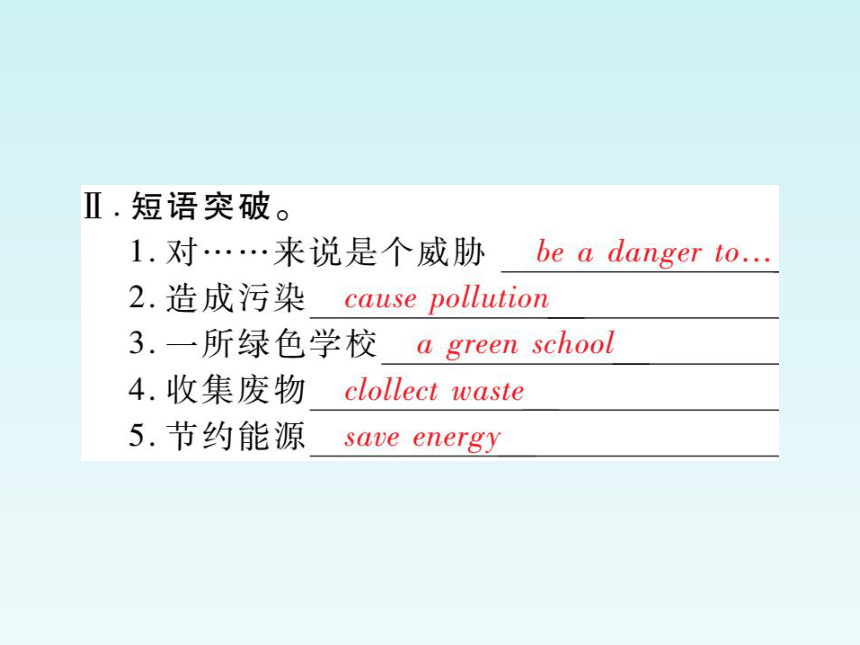
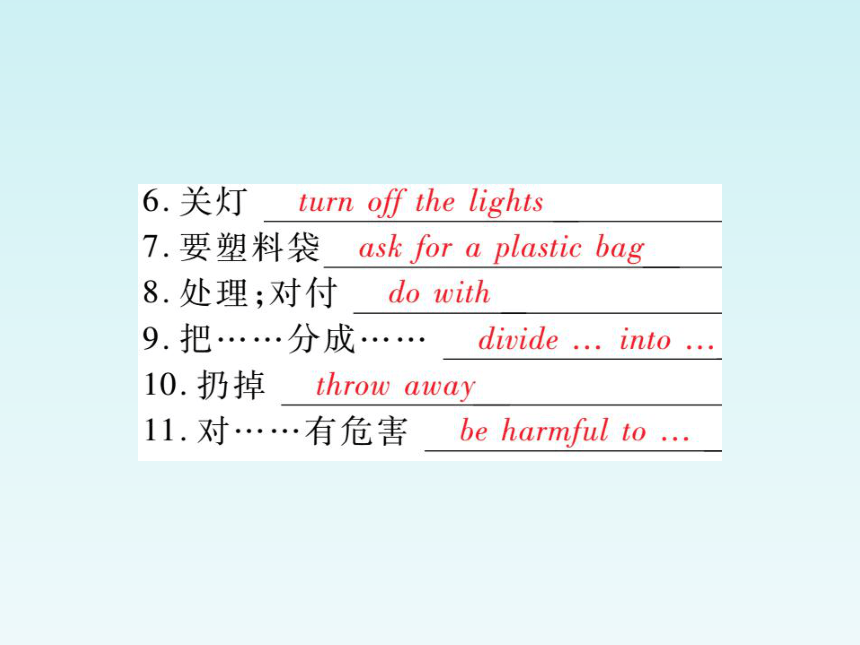
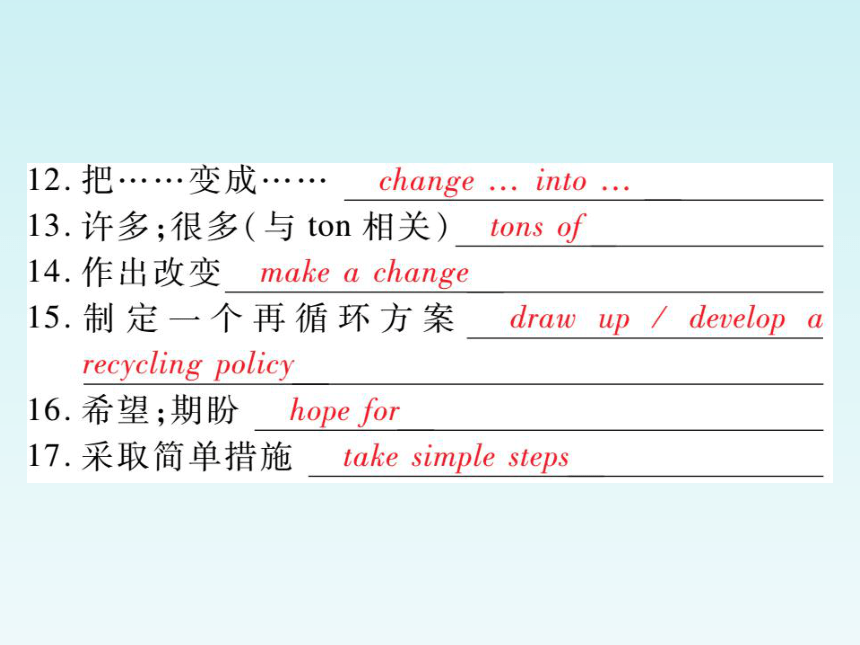

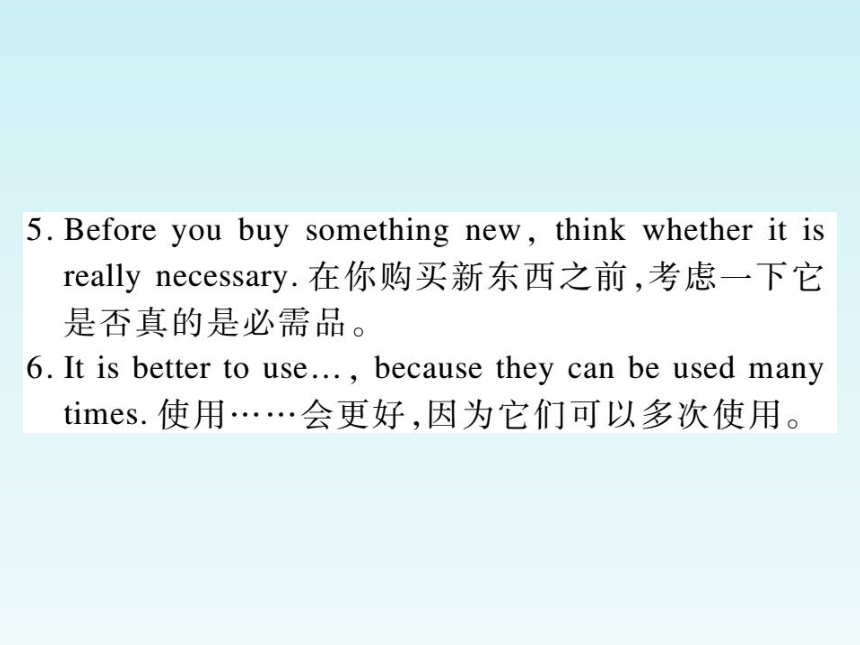

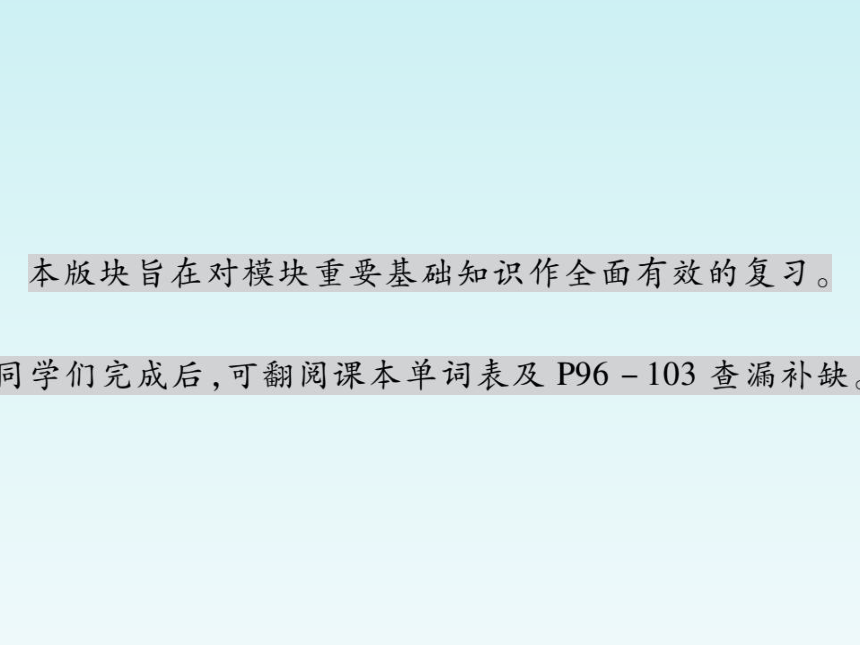

文档简介
(共65张PPT)
Unit 3 Language in use
Reuse means “use again”.
Though pollution is heavy now, I don’t think it’s hopeless.
1. Make new words. Join the parts of words in Box A with the words in Box B. You need to use some of the parts more than once.
A -able -ful im- -less re- un-
B care- collect- hope- -possible
-use -usual -wanted waste-
careful
careless
collectable
hopeful
hopeless
impossible
unused
reused
unusual
unwanted
wasteful
Now work in groups. Play the guessing game English for Fun.
English for Fun
1. full of care___________
2. can be collected ________________
3. full of hope ________________
4. without any hope ________________
careful
collectable
hopeful
hopeless
5. not possible__________
6. not usual ____________
7. without any use _______
8. use again ____________
9. not wanted ___________
10. making a lot of waste _________
impossible
unusual
unused
reused
wasteful
unwanted
Sometimes if you know the meaning of the parts of a word, you can work out the meaning of the whole word.
re + new + able: re = again,
able = can be
renewable = can be new again
Learning to learn
2. Complete the sentences with the words in the box.
hopeful impossible
reuse unhealthy wasteful
1. Polluted water is __________.
2. It is _________ to throw so much food away.
unhealthy
wasteful
3. If you look after things well, you may ________ some of them later.
4. It is __________ to clean up the whole river in such a short time.
5. If we pay attention to pollution now, the future will be _________.
reused
impossible
hopeful
3. Complete the table.
Noun Verb Adjective Adverb
useful/useless
hope hopefully/
hopelessly
pollution —
hope
hopeful/
hopeless
pollute
polluted
water — —
waste
—
— usually/
unusually
water
waste
wasteful
wastefully
usual
4. Complete the sentences with the correct form of the words in Activity 3.
She was _________ that her new job would make her more successful.
hopefully
1. The factory _________ the river, and the fish died.
2. We often walk in the countryside. It is a(n) _______ activity for us.
polluted
usual
3. Do not use so much water. It is very __________.
4. To keep the flowers growing, you need to ________them once a day.
wasteful
water
5. Complete the sentences.
A _________is a box that you keep your lunch in.
1. A ___________ is a card that you write on one side of and send to someone by post.
lunchbox
postcard
2. A ___________ is a room where you have classes at a school.
3. A ___________ is a book that has one or more stories for children.
4. A ___________ is a black board that is used at school for writing on with chalk.
classroom
storybook
blackboard
was invented. The man who invented it was Daguerre, also French. He took a picture of his reading room. In his picture, you could see everything very clearly, even the smallest things.
6. Work in pairs. Look at the picture and answer the questions.
What kinds of things can be recycled
How can these things be reused
paper, plastic
Many paper and plastic things can be used more than one time. Or we can change these things into decorations made by us.
3. How does this help the environment
We don’t need to cut down more trees to make paper if we reuse papers.
4. Have you ever recycled or used things that can be recycled How
I ever recycled to use paper cup, I just use them to make some small decorations such as pen container.
7. Complete the conversation with the correct form of the expressions in the box.
be good for throw away
turn off worry about
Mike: I hear you are off to the
Caribbean for a holiday! Lucky
you! But aren’t you (1)
____________ the pollution
worry about
that such long plane journeys
may cause for the environment
Ken: I know, but what can I do
about it I’ve already tried my
best to protect the environment.
I recycle. I don’t (2)_________ things if I don’t want them any more. I (3) ________ the lights when I leave a room. Don’t tell me I shouldn’t travel by plane any more!
throw away
turn off
Mike: No, of course not. But we can
do more to protect the
environment. For example,
we can help keep the air clean
by planting trees. Trees (4)
___________ the environment.
In this way, we can reduce the
harm of pollution.
Ken: Good! So I can enjoy my
holiday, and when I come
back, I’ll plant some trees!
are good for
Mike: That’s the idea! Maybe we
can all join in and start a
small forest!
8. Listen and check (√)the true sentences.
It is OK to throw used things away. Looking after them takes a lot of time.
2. Do not throw away things made of glass, plastic and paper, but recycle them when possible.
3. Take a bag when you go shopping.
4. Producing electricity and using oil will not cause pollution.
5. Turn off the light when you do not need them.
6. Ride a bike or walk, and do not often drive your car.
9. Listen again and complete the table.
Advice Reasons
1. Don’t throw away things made of _______,
________________, but
_______them. Throwing things away is wasteful.
2. ______your old bags when you can and _________ with you when you go shopping. Plastic bags ___________ recycle.
glass,
plastic and paper
recycle
take a bag
are hard to
Reuse
3. Use less electricity and oil to ________________.
4. Don’t leave lights on and ________________.
5. _______________ and do not often drive your car. Producing electricity
and using oil may
cause __________________
__________________
_________________.
pollution to earth,
water and else in
many different ways
reduce pollution
waste electricity
Walk or cycling
Earth Hour
Earth Hour is held toward the end of March each year. During Earth Hour, people all across the world switch off the lights they do
not need. They do this to show their awareness of climate change.
The first Earth Hour was held in 1977 in Sydney, where more than 2.2 million people switched off their lights. Today, more and more cities
are taking part in the event, such as Beijing, London, Rome and New York, and landmarks like the Empire State Building and the Golden Gate Bridge will go dark.
Discussing what you can do about pollution
10. Work in groups. Decide what kind of pollution you want to talk about.
Choose a subject that you care about the most. It could be water pollution, air pollution, etc.
Find out more information about your subject. Look it up on a website or in a book.
11. Discuss your subject.
Take turns to say what you think about the problem and what can be done.
Listen to what others say. If you agree with what they have said, say “I agree”, “That’s true” or
“That’s a good point”; if you do not agree with what someone says, say “I’m sorry, but I don’t agree. I think that…”
12. Present your group’s ideas to the whole class.
Yes, I agree with you that air pollution is one of the most serious problems. A great deal of energy is needed to run the factories of modern industrial nations. Automobile, trains, planes and
Possible answer
busses need energy, too. Nearly all of this energy is produced by burning fuels. The burning produces wastes, some of which remain in the air, causing air pollution.
Scientists are finding ways to stop air pollution especially in big industrial areas and densely-populated cities. They are studying new ways of generating electricity that may be less damaging to the environment. At the same time,
many power plants are being modernized to give off less polluted material. Also, engineers try to design and locate new power plants to do minimum damage to the environment.
However, it may be that we still have a long way to go before we have a "clean" world. Nearly all of the countries are trying hard to prevent and control air pollution. There indeed seems to be no end to
tasks that environmentalists will be required to do. People will continually find new ways to control pollution.
Unit 3 Language in use
Reuse means “use again”.
Though pollution is heavy now, I don’t think it’s hopeless.
1. Make new words. Join the parts of words in Box A with the words in Box B. You need to use some of the parts more than once.
A -able -ful im- -less re- un-
B care- collect- hope- -possible
-use -usual -wanted waste-
careful
careless
collectable
hopeful
hopeless
impossible
unused
reused
unusual
unwanted
wasteful
Now work in groups. Play the guessing game English for Fun.
English for Fun
1. full of care___________
2. can be collected ________________
3. full of hope ________________
4. without any hope ________________
careful
collectable
hopeful
hopeless
5. not possible__________
6. not usual ____________
7. without any use _______
8. use again ____________
9. not wanted ___________
10. making a lot of waste _________
impossible
unusual
unused
reused
wasteful
unwanted
Sometimes if you know the meaning of the parts of a word, you can work out the meaning of the whole word.
re + new + able: re = again,
able = can be
renewable = can be new again
Learning to learn
2. Complete the sentences with the words in the box.
hopeful impossible
reuse unhealthy wasteful
1. Polluted water is __________.
2. It is _________ to throw so much food away.
unhealthy
wasteful
3. If you look after things well, you may ________ some of them later.
4. It is __________ to clean up the whole river in such a short time.
5. If we pay attention to pollution now, the future will be _________.
reused
impossible
hopeful
3. Complete the table.
Noun Verb Adjective Adverb
useful/useless
hope hopefully/
hopelessly
pollution —
hope
hopeful/
hopeless
pollute
polluted
water — —
waste
—
— usually/
unusually
water
waste
wasteful
wastefully
usual
4. Complete the sentences with the correct form of the words in Activity 3.
She was _________ that her new job would make her more successful.
hopefully
1. The factory _________ the river, and the fish died.
2. We often walk in the countryside. It is a(n) _______ activity for us.
polluted
usual
3. Do not use so much water. It is very __________.
4. To keep the flowers growing, you need to ________them once a day.
wasteful
water
5. Complete the sentences.
A _________is a box that you keep your lunch in.
1. A ___________ is a card that you write on one side of and send to someone by post.
lunchbox
postcard
2. A ___________ is a room where you have classes at a school.
3. A ___________ is a book that has one or more stories for children.
4. A ___________ is a black board that is used at school for writing on with chalk.
classroom
storybook
blackboard
was invented. The man who invented it was Daguerre, also French. He took a picture of his reading room. In his picture, you could see everything very clearly, even the smallest things.
6. Work in pairs. Look at the picture and answer the questions.
What kinds of things can be recycled
How can these things be reused
paper, plastic
Many paper and plastic things can be used more than one time. Or we can change these things into decorations made by us.
3. How does this help the environment
We don’t need to cut down more trees to make paper if we reuse papers.
4. Have you ever recycled or used things that can be recycled How
I ever recycled to use paper cup, I just use them to make some small decorations such as pen container.
7. Complete the conversation with the correct form of the expressions in the box.
be good for throw away
turn off worry about
Mike: I hear you are off to the
Caribbean for a holiday! Lucky
you! But aren’t you (1)
____________ the pollution
worry about
that such long plane journeys
may cause for the environment
Ken: I know, but what can I do
about it I’ve already tried my
best to protect the environment.
I recycle. I don’t (2)_________ things if I don’t want them any more. I (3) ________ the lights when I leave a room. Don’t tell me I shouldn’t travel by plane any more!
throw away
turn off
Mike: No, of course not. But we can
do more to protect the
environment. For example,
we can help keep the air clean
by planting trees. Trees (4)
___________ the environment.
In this way, we can reduce the
harm of pollution.
Ken: Good! So I can enjoy my
holiday, and when I come
back, I’ll plant some trees!
are good for
Mike: That’s the idea! Maybe we
can all join in and start a
small forest!
8. Listen and check (√)the true sentences.
It is OK to throw used things away. Looking after them takes a lot of time.
2. Do not throw away things made of glass, plastic and paper, but recycle them when possible.
3. Take a bag when you go shopping.
4. Producing electricity and using oil will not cause pollution.
5. Turn off the light when you do not need them.
6. Ride a bike or walk, and do not often drive your car.
9. Listen again and complete the table.
Advice Reasons
1. Don’t throw away things made of _______,
________________, but
_______them. Throwing things away is wasteful.
2. ______your old bags when you can and _________ with you when you go shopping. Plastic bags ___________ recycle.
glass,
plastic and paper
recycle
take a bag
are hard to
Reuse
3. Use less electricity and oil to ________________.
4. Don’t leave lights on and ________________.
5. _______________ and do not often drive your car. Producing electricity
and using oil may
cause __________________
__________________
_________________.
pollution to earth,
water and else in
many different ways
reduce pollution
waste electricity
Walk or cycling
Earth Hour
Earth Hour is held toward the end of March each year. During Earth Hour, people all across the world switch off the lights they do
not need. They do this to show their awareness of climate change.
The first Earth Hour was held in 1977 in Sydney, where more than 2.2 million people switched off their lights. Today, more and more cities
are taking part in the event, such as Beijing, London, Rome and New York, and landmarks like the Empire State Building and the Golden Gate Bridge will go dark.
Discussing what you can do about pollution
10. Work in groups. Decide what kind of pollution you want to talk about.
Choose a subject that you care about the most. It could be water pollution, air pollution, etc.
Find out more information about your subject. Look it up on a website or in a book.
11. Discuss your subject.
Take turns to say what you think about the problem and what can be done.
Listen to what others say. If you agree with what they have said, say “I agree”, “That’s true” or
“That’s a good point”; if you do not agree with what someone says, say “I’m sorry, but I don’t agree. I think that…”
12. Present your group’s ideas to the whole class.
Yes, I agree with you that air pollution is one of the most serious problems. A great deal of energy is needed to run the factories of modern industrial nations. Automobile, trains, planes and
Possible answer
busses need energy, too. Nearly all of this energy is produced by burning fuels. The burning produces wastes, some of which remain in the air, causing air pollution.
Scientists are finding ways to stop air pollution especially in big industrial areas and densely-populated cities. They are studying new ways of generating electricity that may be less damaging to the environment. At the same time,
many power plants are being modernized to give off less polluted material. Also, engineers try to design and locate new power plants to do minimum damage to the environment.
However, it may be that we still have a long way to go before we have a "clean" world. Nearly all of the countries are trying hard to prevent and control air pollution. There indeed seems to be no end to
tasks that environmentalists will be required to do. People will continually find new ways to control pollution.
同课章节目录
- Module 1 Wonders of the world
- Unit 1 It's more than 2,000 years old.
- Unit 2 The Grand Canyon was not just big.
- Unit 3 Language in use
- Module 2 Public holidays
- Unit 1 My family always go somewhere interesting a
- Unit 2 We have celebrated the festival since the f
- Unit 3 Language in use
- Module 3 Heroes
- Unit 1 She trained hard,so she became a great play
- Unit 2There were few doctors, so he had to work ve
- Unit 3 Language in use
- Module 4 Home alone
- Unit 1 I can look after myself, although it won’t
- Unit 2 I became so bored with their orders that I
- Unit 3 Language in use
- Module 5 Museums
- Unit 1 Don't cross that rope!
- Unit 2 If you ever go to London, make sure you vis
- Unit 3 Language in use
- Module 6 Problems
- Unit 1 If I start after dinner, I'll finish it be
- Unit 2 If you tell him the truth now, you will sho
- Unit 3 Language in use
- Revision Module A
- Module 7 Great books
- Unit 1 We're still influenced by Confucius's idea
- Unit 2 It is still read and loved.
- Unit 3 Language in use
- Module 8 Sports life
- Unit 1 Daming wasn't chosen for the team last time
- Unit 2 He was invited to competitions around the w
- Unit 3 Language in use
- Module 9 Great inventions
- Unit 1 Will computers be used more than books in t
- Unit 2 Will books be replaced by the Internet?
- Unit 3 Language in use
- Module 10 Australia
- Unit 1 I have some photos that I took in Australia
- Unit 2 The game that they like most is Australian
- Unit 3 Language in use
- Module 11 Photos
- Unit 1 He's the boy who won the photo competition
- Unit 2 The photo which we liked best was taken by
- Unit 3 Language in use
- Module 12 Save our world
- Unit 1 If everyone starts to do something, the wor
- Unit 2 Repeat these three words daily: reduce, reu
- Unit 3 Language in use
- Revision Module B
